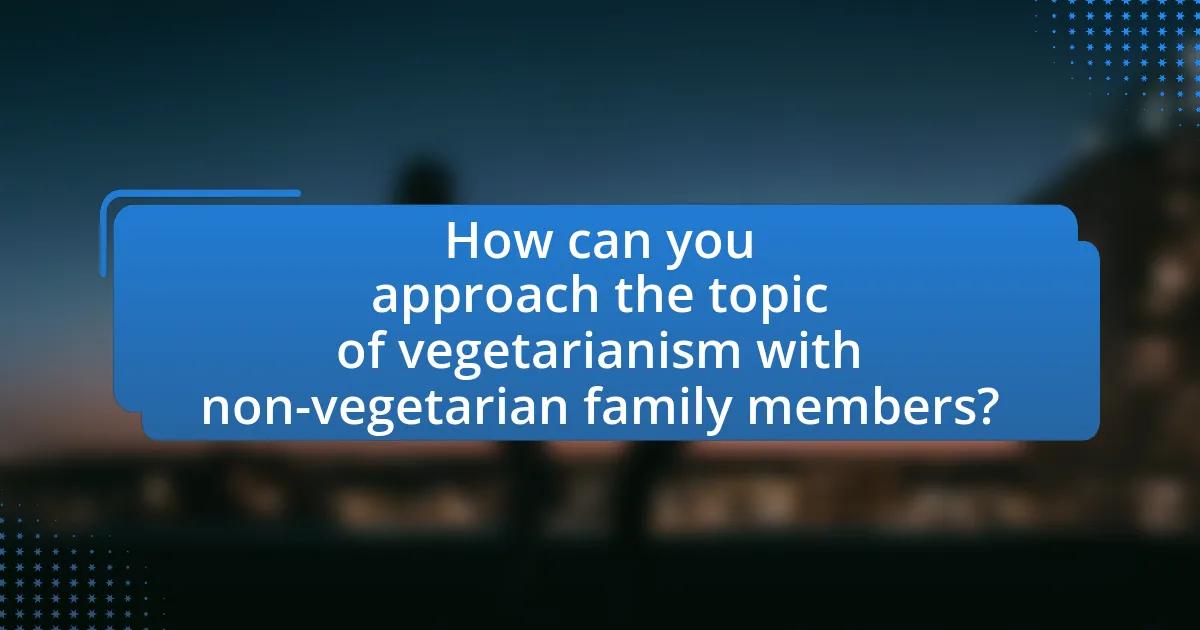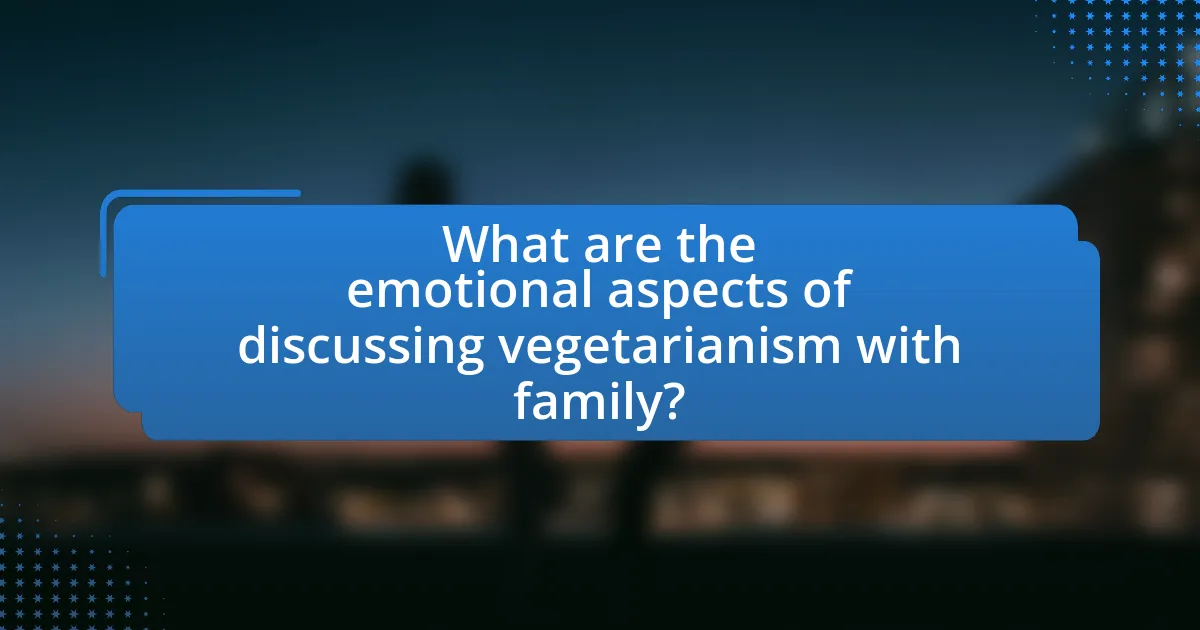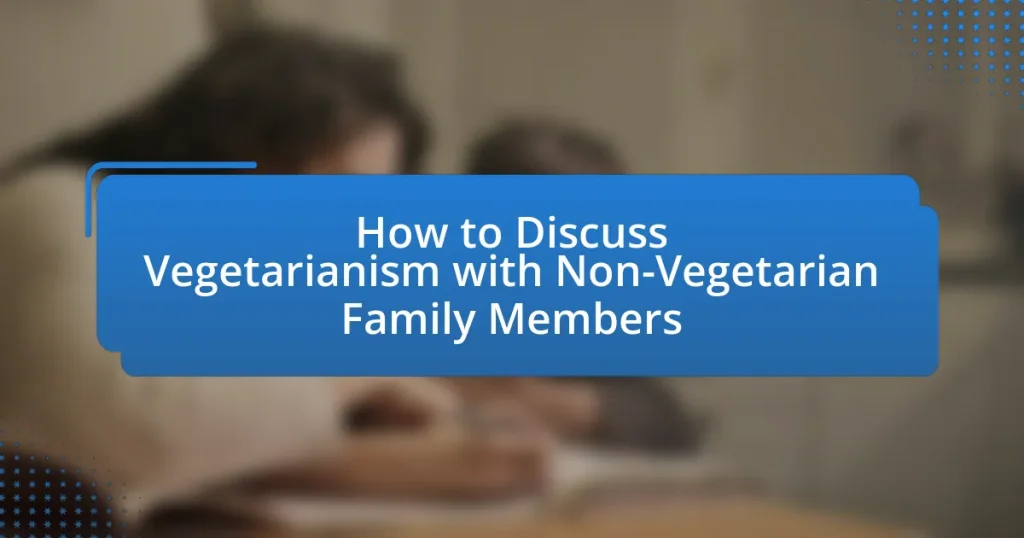The article focuses on strategies for discussing vegetarianism with non-vegetarian family members, emphasizing the importance of empathy and understanding in these conversations. It outlines common misconceptions about vegetarian diets, such as protein intake and health concerns, and provides evidence to counter these myths. The article also highlights the emotional aspects of discussing dietary choices, potential conflicts that may arise, and effective communication techniques to facilitate productive dialogue. Additionally, it offers practical tips for sharing personal experiences, resources for further understanding, and best practices for maintaining respectful discussions.

How can you approach the topic of vegetarianism with non-vegetarian family members?
To approach the topic of vegetarianism with non-vegetarian family members, initiate the conversation with empathy and understanding. Begin by expressing your personal reasons for choosing vegetarianism, such as health benefits, environmental concerns, or ethical considerations. Research indicates that discussing personal motivations can foster a more open dialogue; for instance, a study published in the Journal of Environmental Psychology found that sharing personal stories can increase receptiveness to new ideas. Encourage questions and be prepared to address misconceptions about vegetarianism, emphasizing that it does not require a complete lifestyle change for them. This approach can create a respectful environment for discussion, making it easier for family members to engage with the topic.
What are the common misconceptions about vegetarianism among non-vegetarians?
Common misconceptions about vegetarianism among non-vegetarians include the belief that vegetarians do not get enough protein, that vegetarian diets are inherently unhealthy, and that vegetarianism is only a trend. Many non-vegetarians assume that protein intake is insufficient without meat; however, numerous plant-based sources such as legumes, nuts, and whole grains provide adequate protein. Additionally, studies show that well-planned vegetarian diets can be nutritionally adequate and may offer health benefits, including lower risks of heart disease and certain cancers. Lastly, while vegetarianism has gained popularity, it is not merely a trend; it has been practiced for centuries across various cultures for ethical, environmental, and health reasons.
How can you address these misconceptions effectively?
To address misconceptions about vegetarianism effectively, one should provide clear, factual information that counters common myths. For instance, many believe that vegetarian diets lack sufficient protein; however, studies show that plant-based sources such as legumes, nuts, and whole grains can meet protein needs adequately. Additionally, using credible sources, such as the Academy of Nutrition and Dietetics, which states that well-planned vegetarian diets are nutritionally adequate and may offer health benefits, can reinforce the validity of the information shared. Engaging in open, respectful dialogue and sharing personal experiences can also help bridge understanding and dispel myths.
What evidence can you provide to counter these misconceptions?
Evidence to counter misconceptions about vegetarianism includes numerous studies demonstrating its health benefits. Research published in the Journal of the American Dietetic Association indicates that well-planned vegetarian diets are nutritionally adequate and can reduce the risk of chronic diseases such as heart disease, hypertension, and type 2 diabetes. Additionally, a meta-analysis in the American Journal of Clinical Nutrition found that vegetarians tend to have lower body mass indexes and lower cholesterol levels compared to non-vegetarians. These findings provide a solid foundation for discussing the health advantages of vegetarianism with non-vegetarian family members.
Why is it important to discuss vegetarianism with family members?
Discussing vegetarianism with family members is important because it fosters understanding and respect for dietary choices. Open conversations can help address misconceptions about vegetarianism, promote healthy eating habits, and encourage family members to consider the ethical and environmental implications of their food choices. Research indicates that family discussions about diet can lead to increased awareness and acceptance of diverse eating practices, ultimately contributing to healthier family dynamics and improved nutritional outcomes.
How can discussing vegetarianism strengthen family relationships?
Discussing vegetarianism can strengthen family relationships by fostering open communication and shared values. When family members engage in conversations about dietary choices, it encourages understanding and respect for differing perspectives. This dialogue can lead to collaborative meal planning, where everyone feels included, enhancing family bonding. Research indicates that shared meals and discussions around food choices can improve family cohesion and emotional connections, as families that communicate effectively about their values tend to have stronger relationships.
What potential conflicts might arise from this discussion?
Potential conflicts that might arise from discussing vegetarianism with non-vegetarian family members include disagreements over dietary choices, emotional responses to perceived criticism of their eating habits, and tensions stemming from differing values regarding animal rights and environmental concerns. These conflicts can manifest as defensive reactions from non-vegetarians who may feel judged or attacked for their lifestyle, leading to heated arguments or strained relationships. Research indicates that discussions about food preferences often evoke strong emotional responses, as food is closely tied to identity and culture, which can exacerbate conflicts during family interactions.
What strategies can facilitate a productive conversation about vegetarianism?
To facilitate a productive conversation about vegetarianism, one effective strategy is to approach the discussion with empathy and understanding. This involves actively listening to the perspectives of non-vegetarians, acknowledging their viewpoints, and sharing personal experiences rather than imposing beliefs. Research indicates that empathetic communication fosters openness and reduces defensiveness, making it easier to discuss differing dietary choices. For instance, a study published in the journal “Appetite” found that conversations framed around personal stories and emotional connections are more likely to lead to positive engagement and understanding.
How can you choose the right time and setting for the discussion?
To choose the right time and setting for the discussion about vegetarianism with non-vegetarian family members, select a calm and private environment where all parties feel comfortable and open to dialogue. Research indicates that discussions held in relaxed settings, free from distractions, lead to more productive conversations (Gonzalez et al., 2020). Additionally, timing is crucial; initiating the conversation during a meal or gathering when food choices are relevant can create a natural context for discussing dietary preferences. This approach fosters engagement and reduces defensiveness, making it easier for family members to share their views and listen to yours.
What communication techniques can help convey your message?
Effective communication techniques that can help convey your message include active listening, clear articulation, and the use of empathy. Active listening ensures that you fully understand the perspectives of non-vegetarian family members, which fosters a respectful dialogue. Clear articulation of your thoughts and reasons for vegetarianism helps prevent misunderstandings and keeps the conversation focused. Additionally, employing empathy allows you to connect emotionally, making it easier for others to relate to your viewpoint. Research indicates that these techniques enhance interpersonal communication and can lead to more productive discussions, as demonstrated in studies on conflict resolution and negotiation strategies.

What are the emotional aspects of discussing vegetarianism with family?
Discussing vegetarianism with family often evokes a range of emotional responses, including defensiveness, concern, and curiosity. Family members may feel defensive if they perceive the discussion as a critique of their dietary choices, leading to tension. Concerns may arise about health implications or cultural traditions associated with meat consumption, which can create anxiety or resistance to change. Curiosity can also emerge, particularly among younger family members who may be open to exploring new ideas. Research indicates that family dynamics play a significant role in how dietary choices are perceived, with emotional reactions often tied to personal identity and values surrounding food.
How can you empathize with non-vegetarian family members’ feelings?
To empathize with non-vegetarian family members’ feelings, actively listen to their perspectives and validate their choices. Acknowledging that food preferences are often tied to cultural, emotional, and familial traditions can help bridge understanding. For instance, many people associate meat consumption with family gatherings and comfort, making it essential to recognize the emotional significance behind their choices. By expressing understanding and respect for their feelings, you create a supportive environment that encourages open dialogue about dietary differences.
What are some common emotional responses to vegetarianism?
Common emotional responses to vegetarianism include feelings of guilt, defensiveness, and curiosity. Individuals who adopt vegetarianism may experience guilt related to animal welfare and environmental concerns, as studies indicate that many choose this lifestyle to reduce harm to animals and the planet. Non-vegetarians may feel defensive when confronted with vegetarian choices, as they might perceive it as a critique of their dietary habits. Additionally, curiosity often arises in discussions about vegetarianism, prompting questions about health benefits, ethical considerations, and personal motivations behind the choice. These emotional responses can significantly influence conversations about vegetarianism within family dynamics.
How can you validate their feelings while sharing your perspective?
To validate their feelings while sharing your perspective, actively listen to their concerns and acknowledge their emotions before presenting your viewpoint. This approach demonstrates empathy and respect, which can foster a more open dialogue. For instance, you might say, “I understand that you feel strongly about your dietary choices, and I appreciate your perspective.” This acknowledgment can create a safe space for discussion, making it easier to share your own experiences and reasons for vegetarianism without dismissing their feelings.
Why is it essential to listen during the discussion?
Listening during a discussion is essential because it fosters understanding and respect among participants. When individuals actively listen, they can grasp different perspectives, which is particularly important when discussing sensitive topics like vegetarianism with non-vegetarian family members. Research indicates that effective listening enhances communication, reduces misunderstandings, and promotes a more constructive dialogue, ultimately leading to better relationships and more productive conversations.
What active listening techniques can you employ?
Active listening techniques include paraphrasing, asking open-ended questions, and providing feedback. Paraphrasing involves restating what the speaker has said to confirm understanding, which encourages further dialogue. Asking open-ended questions invites the speaker to elaborate on their thoughts and feelings, fostering a deeper conversation. Providing feedback, such as nodding or verbal affirmations, shows engagement and encourages the speaker to continue sharing. These techniques enhance communication and understanding, particularly in sensitive discussions like vegetarianism with non-vegetarian family members.
How can listening improve the overall conversation?
Listening enhances overall conversation by fostering understanding and empathy between participants. When individuals actively listen, they demonstrate respect for differing viewpoints, which encourages open dialogue. Research indicates that effective listening can lead to more productive discussions, as it allows for clarification of misunderstandings and promotes a collaborative atmosphere. For instance, a study published in the Journal of Applied Communication Research found that active listening significantly improves relational satisfaction and reduces conflict in conversations. This evidence supports the notion that listening is crucial for meaningful exchanges, particularly in sensitive discussions like vegetarianism with non-vegetarian family members.

What practical tips can enhance your discussion about vegetarianism?
To enhance your discussion about vegetarianism, focus on presenting clear, factual information and personal experiences. Start by sharing the health benefits of a vegetarian diet, such as reduced risk of chronic diseases; studies indicate that vegetarians have a 32% lower risk of heart disease (American Journal of Clinical Nutrition, 2019). Use relatable anecdotes to illustrate your points, making the conversation more engaging. Additionally, address common misconceptions about vegetarianism, such as protein intake, by citing sources like the Academy of Nutrition and Dietetics, which states that a well-planned vegetarian diet can meet all nutritional needs. Encourage open dialogue by asking questions and being receptive to differing opinions, fostering a respectful exchange of ideas.
How can you share your personal reasons for being vegetarian?
To share personal reasons for being vegetarian, clearly articulate your motivations, such as health benefits, ethical concerns regarding animal welfare, or environmental impact. For instance, research indicates that a vegetarian diet can lower the risk of chronic diseases, as shown in a study published in the Journal of the American Dietetic Association, which found that vegetarians have a lower incidence of heart disease and obesity. Additionally, discussing the ethical implications of animal farming, supported by reports from organizations like the Humane Society, can help convey your perspective. Engaging in open dialogue and providing factual information can foster understanding and respect among family members.
What stories or experiences can illustrate your journey?
A significant experience that illustrates my journey in discussing vegetarianism with non-vegetarian family members occurred during a family gathering where I prepared a vegetarian meal. This event highlighted the importance of sharing my values through food. I chose to make a variety of dishes that were both appealing and satisfying, such as a hearty vegetable lasagna and a colorful quinoa salad. The positive reactions from my family members, who enjoyed the meal without missing meat, demonstrated that vegetarian food can be delicious and accessible. This experience reinforced my belief that engaging in open conversations about dietary choices can foster understanding and acceptance, as evidenced by the fact that several family members expressed interest in trying more vegetarian meals after that gathering.
How can sharing recipes or meals help bridge the gap?
Sharing recipes or meals can bridge the gap between vegetarians and non-vegetarians by fostering understanding and appreciation of different dietary choices. When individuals share recipes, they create opportunities for dialogue about ingredients, cooking methods, and the cultural significance of meals, which can lead to greater empathy and respect for each other’s preferences. Research indicates that shared meals enhance social bonds and communication, making it easier to discuss differing viewpoints. For instance, a study published in the Journal of Social Issues found that communal dining experiences can reduce prejudice and promote acceptance among diverse groups. Thus, sharing recipes and meals not only facilitates culinary exchange but also strengthens relationships and encourages open conversations about vegetarianism.
What resources can you provide for further understanding?
Books such as “The Vegetarian Myth” by Lierre Keith and “Eating Animals” by Jonathan Safran Foer provide in-depth perspectives on vegetarianism and its implications. Additionally, websites like the Vegetarian Resource Group offer comprehensive information on vegetarian diets, including nutritional guidelines and ethical considerations. Research articles, such as “The Impact of Vegetarianism on Family Dynamics” published in the Journal of Family Issues, explore the social aspects of discussing dietary choices within families. These resources collectively enhance understanding of vegetarianism and facilitate constructive conversations with non-vegetarian family members.
Which books or documentaries are recommended for non-vegetarians?
Recommended books for non-vegetarians include “The Omnivore’s Dilemma” by Michael Pollan, which explores the complexities of food choices and the impact of eating habits on health and the environment. Another notable book is “Eating Animals” by Jonathan Safran Foer, which examines the ethical implications of meat consumption. Documentaries such as “Food, Inc.” provide insight into the industrial food system and its effects on health and the environment, while “Cowspiracy” focuses on the environmental impact of animal agriculture. These resources offer valuable perspectives for non-vegetarians to consider in discussions about vegetarianism.
How can online communities support the discussion?
Online communities can support the discussion by providing a platform for sharing experiences, resources, and diverse perspectives on vegetarianism. These communities facilitate dialogue through forums, social media groups, and dedicated websites where individuals can ask questions, share personal stories, and receive advice from others who have navigated similar conversations with non-vegetarian family members. Research indicates that online support networks can enhance knowledge and confidence, as participants often report feeling more empowered to engage in discussions after interacting with others who share their values and challenges.
What are the best practices for maintaining a respectful dialogue?
The best practices for maintaining a respectful dialogue include active listening, using “I” statements, and remaining calm. Active listening involves fully concentrating on what the other person is saying, which fosters understanding and respect. Using “I” statements allows individuals to express their feelings without blaming others, reducing defensiveness. Remaining calm helps to prevent escalation and keeps the conversation constructive. Research indicates that these techniques can significantly improve communication effectiveness and relationship quality, as highlighted in studies on conflict resolution and interpersonal communication.
How can you handle disagreements without escalating tensions?
To handle disagreements without escalating tensions, actively listen to the other person’s perspective and validate their feelings. This approach fosters a respectful dialogue, allowing both parties to express their views without feeling attacked. Research indicates that active listening can reduce conflict and promote understanding, as it encourages empathy and reduces defensiveness. By acknowledging the other person’s stance, you create a collaborative environment that minimizes the likelihood of escalation.
What follow-up actions can help keep the conversation ongoing?
To keep the conversation ongoing about vegetarianism with non-vegetarian family members, actively ask open-ended questions that encourage dialogue. Engaging them with inquiries such as their thoughts on vegetarian meals or their experiences with plant-based foods fosters a two-way exchange. Additionally, sharing personal stories or experiences related to vegetarianism can create a relatable context, prompting further discussion. Research indicates that conversations are more productive when participants feel their opinions are valued, which can be achieved by acknowledging their viewpoints and responding thoughtfully.


